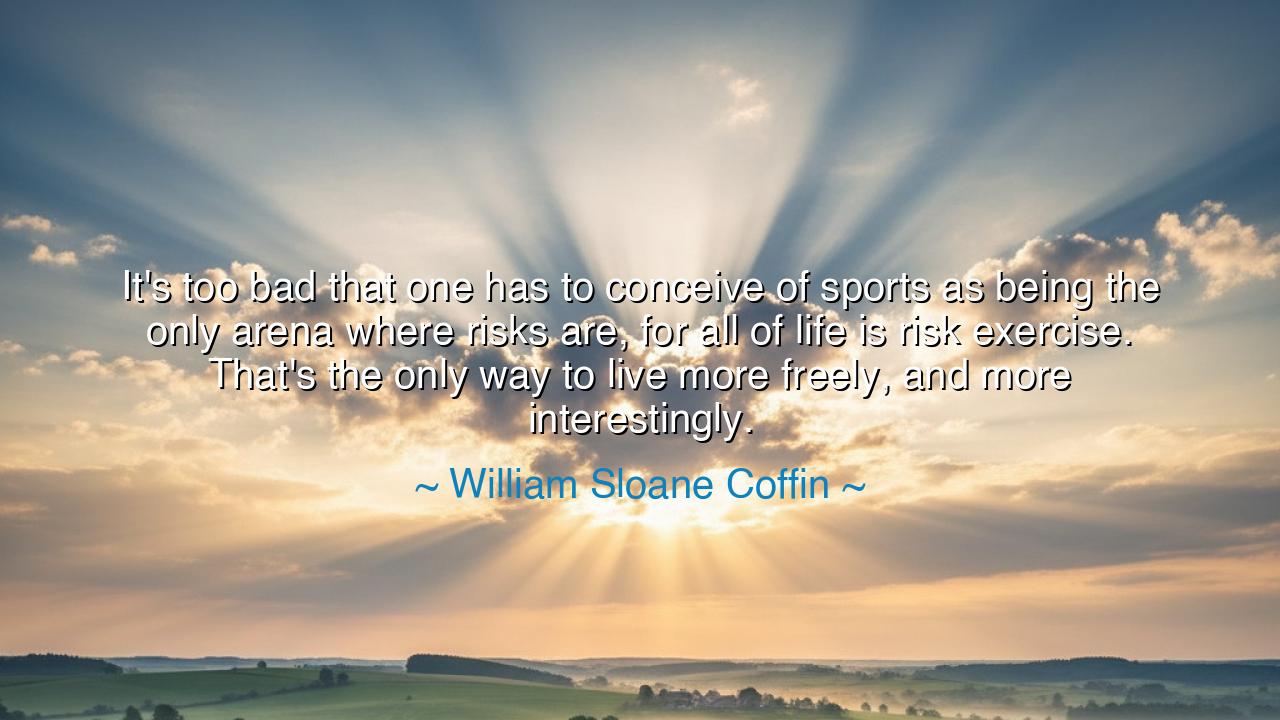
It's too bad that one has to conceive of sports as being the
It's too bad that one has to conceive of sports as being the only arena where risks are, for all of life is risk exercise. That's the only way to live more freely, and more interestingly.






The words of William Sloane Coffin—“It’s too bad that one has to conceive of sports as being the only arena where risks are, for all of life is risk exercise. That’s the only way to live more freely, and more interestingly.”—resound like a clarion call across the ages. He speaks not only of games, nor of contests upon the field, but of the very essence of human existence. For what is life, if not a daring leap into the unknown? What is breath itself, if not a gamble against the silence of the grave? To live is to risk, and to avoid risk is to wither before one’s time.
When Coffin says it is “too bad” to see sports as the sole realm of risk, he reminds us that true courage must not be confined to stadiums or arenas. Yes, in sports, the crowd cheers the brave: the runner who defies fatigue, the climber who scales the impossible wall, the fighter who refuses to yield. Yet beyond the roar of the crowd, life itself is filled with moments that demand equal bravery: speaking truth when it is dangerous, loving deeply when rejection threatens, pursuing dreams that may fail, standing for justice though the world may oppose you. All of life is risk exercise.
The ancients knew this well. Consider the voyage of Odysseus, who risked not only the wrath of gods but the fury of sea and storm to return home. His life was not a series of games, but a series of dangers willingly faced. Or think of Socrates, who risked his very life by speaking truth to Athens, choosing the hemlock rather than betraying his philosophy. Neither man stepped into a sporting arena, yet both lived “freely and interestingly” precisely because they embraced risk rather than fled from it.
History too gives us modern echoes. Rosa Parks, by refusing to give up her seat, risked arrest, humiliation, and violence. Yet in that risk she found freedom—not only for herself, but for millions who followed. Neil Armstrong risked his life stepping onto the surface of the moon, but that risk lifted humanity into a realm beyond Earth, expanding our vision forever. Their lives remind us that risk is not the province of athletes alone, but the condition of all who dare to live boldly.
The emotional force of Coffin’s words lies in their revelation: to fear risk is to settle for a cage, to live safely but shallowly. To embrace risk is to live with depth, color, and power. Freedom is born in risk. Safety may bring comfort, but it rarely brings greatness. The most “interesting” lives are those that gamble against fear and venture into uncharted territory, whether in art, in love, in justice, or in faith.
For the seeker of wisdom, the lesson is luminous: do not envy the athlete alone for their courage. Ask yourself instead—what risks am I willing to take? Am I prepared to stand for truth even if it costs me friends? To pursue love even if it may break my heart? To begin the work my soul burns for, even if it may fail? For without risk, there is no true life. The body may survive, but the spirit will sleep.
What then must we do? Each day, embrace a small risk. Speak when silence tempts you. Step where comfort holds you back. Begin the work you fear to begin. Love with a heart unarmored. And when greater moments come—when destiny demands that you choose between safety and purpose—may you remember Coffin’s words, and choose the risk that leads to freedom.
Thus, let this wisdom pass to all generations: life itself is a risk exercise. To live freely is to accept uncertainty. To live interestingly is to embrace danger for the sake of meaning. Let us not confine courage to the stadium, but let it spill into every corner of our lives. For in the end, it is not the safe path that shapes legends, but the risky one, trodden by those who dared.






AAdministratorAdministrator
Welcome, honored guests. Please leave a comment, we will respond soon